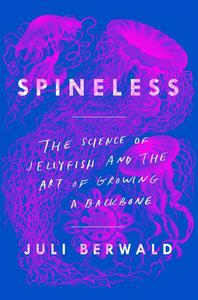
 Spineless: The Science of Jellyfish and the Art of Growing a Backbone puts the spotlight on an understudied and generally underappreciated marine animal, showing how its fate may be tied to manmade changes in the natural world. Spineless is also the story of Juli Berwald, an ocean science Ph.D., reigniting her passion for science and nature through her immersion in the world of jellyfish. Berwald puts herself in the narrative, bringing the reader along as she prepares and cooks jellyfish, raises specimens in her dining room, swims near an enormous bloom off an Israeli beach and much more. Berwald excels at depicting the wonder and appreciation she has gained for the strange, gelatinous creatures and the ocean that sustains them.
Spineless: The Science of Jellyfish and the Art of Growing a Backbone puts the spotlight on an understudied and generally underappreciated marine animal, showing how its fate may be tied to manmade changes in the natural world. Spineless is also the story of Juli Berwald, an ocean science Ph.D., reigniting her passion for science and nature through her immersion in the world of jellyfish. Berwald puts herself in the narrative, bringing the reader along as she prepares and cooks jellyfish, raises specimens in her dining room, swims near an enormous bloom off an Israeli beach and much more. Berwald excels at depicting the wonder and appreciation she has gained for the strange, gelatinous creatures and the ocean that sustains them.
Berwald's interest in jellyfish was prompted by the appearance across the world of massive aggregations known as blooms. In some cases, the jellyfish were so numerous that they dominated the ecosystem and transformed productive fisheries into "a sea of goo." By some accounts, the jellyfish were benefiting from "global warming's evil twin," ocean acidification, but Berwald quickly realized that their relationship to climate change is not easy to untangle. She argues, "Jellyfish are indeed obscure and neglected both by science and the public," and sets out to discover what she can about jellyfish and their ties to "the future of our oceans, our climate, and us."
Luckily for Berwald and her readers, jellyfish are endlessly fascinating. Consider the case of the "immortal jellyfish," a species named Turritopsis capable of reversing a jellyfish's normal life cycle, a feat comparable to "if a butterfly were able to revert to its caterpillar stage." Turritopsis can die--otherwise the ocean would be wall-to-wall immortal jellyfish--"but at least theoretically, the jellyfish can morph forward and backward through their life cycle forever." Then, there's the saga of "Robojelly," an attempt at constructing a robotic jellyfish that helped change our understanding of how jellyfish swim. "Jellyfish actually suck themselves through the water, like the way you're using that straw," Berwald enthuses at one point to her nonplussed daughter.
Jellyfish and people are increasingly getting in each other's way. Masses of the aquatic animal have clogged power plants, desalination plants and even a nuclear-powered aircraft carrier. Jellyfish can also ruin a trip to the beach, with the National Science Foundation estimating that there are 150 million jellyfish stings each year. The stings range in severity, but one particularly virulent species is responsible for 77 deaths in Australia, as reported in 2016. Invasive species, along with overfishing, have led to population explosions that leave fishers with nets full of jellies. Despite all of this, scientists are still unsure if populations are increasing globally. Jellyfish are fascinating in part because there's so much more to find out about them. In Spineless, Berwald demonstrates that our oceans represent a scientific frontier at least as exciting and promising as space, and posits jellyfish as a prime candidate for study and appreciation. --Hank Stephenson, bookseller, Flyleaf Books, Chapel Hill, N.C.
Shelf Talker: An ocean science scholar follows her passion for jellyfish across the globe, unearthing anecdotes and evidence for how these strange, ethereal creatures are crucial to understanding our oceans.

